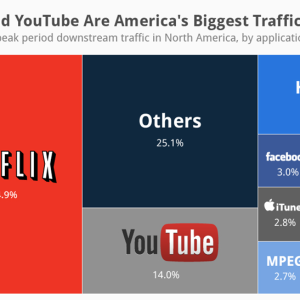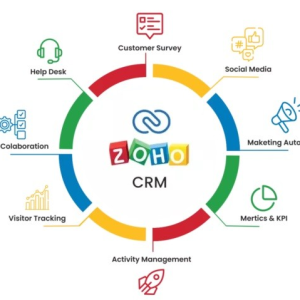Introduction
It’s no secret that mobile marketing is one of the most efficient and popular ways to connect with customers. However, to be successful, businesses need understand the mobile marketing strategies and avoid common mistakes and myths that can doom a campaign before it even starts. This guide will teach you everything you need to know about failed mobile marketing strategies, so you can avoid making the same mistakes yourself.
Mobile-optimized websites get 15% more unique clicks
IMPACT
What is mobile advertising and why is it so popular?
Mobile advertising, a powerful marketing tool, employs mobile devices to connect with customers through a myriad of mediums, such as SMS (short message service) or MMS (multimedia messaging service) messages, apps, mobile websites, and even conventional TV and radio ads.
The immense popularity of mobile advertising stems from its unique ability to foster intimate and personalized connections between businesses and customers, creating a virtuous cycle of trust and loyalty. This is achieved by giving customers the option to opt-in to receive notifications or text messages from businesses, which provides businesses with an unprecedented level of direct access to their audience.
In addition, mobile advertising is particularly adept at targeting customers on the move, who may be too busy to engage with traditional marketing methods, such as TV or print ads. The efficacy of mobile advertising in capturing the attention of customers on the go is further amplified by the impressive burstiness and versatility of the medium. This results in a more intricate and elaborate web of communication between businesses and their customers, catalyzing exponential growth and success.

Common mistakes of mobile marketing strategies
When it comes to mobile advertising, businesses are prone to committing numerous faux pas that can undermine the efficacy of their campaign. Let’s examine some of the most prevalent blunders:
- Failure to Define Their Target Market: One of the most frequently observed errors in mobile advertising is a dearth of attention paid to the target market. Without a thorough comprehension of the target audience, crafting an effective marketing campaign can prove to be an insurmountable task.
- Lack of Understanding on How Mobile Devices Operate: Another misstep businesses make is an insufficient understanding of how mobile devices function. It is paramount to comprehend how consumers interact with their mobile devices to formulate a successful marketing campaign.
- Inconsistent Messaging: Businesses must ensure that the messaging across all platforms is coherent when developing a mobile advertising campaign. This necessitates the usage of the same message on the website, email campaign, and mobile ads.
- Ineffectual Call to Action: A prevalent error is the failure to create a robust call to action. The call to action is what persuades people to take the intended action, such as making a purchase or subscribing to a newsletter.
- Absence of Campaign Testing: Prior to launching a mobile advertising campaign, it is imperative to test the campaign’s effectiveness. One approach to achieve this is by dispatching a test message to a small sample size and subsequently evaluating the results.
- Failing to Gauge the Outcomes: Many businesses blunder by not measuring the outcomes of their mobile advertising campaigns. This includes monitoring click-through rates, conversion rates, and opt-ins, among other parameters.
- Not Tweaking the Campaign: If a mobile advertising campaign fails to deliver the anticipated results, it’s imperative to adjust the campaign. This could involve modifying the message, offer, or target market to boost campaign performance.
- Failing to Keep Pace with Technology: Given that mobile advertising is constantly transforming and evolving, businesses need to keep up with the latest developments to remain competitive and stay ahead of the curve.
- Not Anticipating the Future: To be successful, businesses creating a mobile advertising campaign must contemplate the future. This entails preparing for upcoming technological advancements, shifts in the market, and novel techniques to engage their target audience.
- Neglecting Professional Assistance: One of the most common mistakes businesses make is not seeking professional assistance. Numerous companies offer mobile advertising services, and finding a competent one that can help create a successful campaign is crucial.
The modern way to connect with consumers is through mobile advertising. Nevertheless, as with anything in life and business, certain missteps can be taken when doing so – by adhering to these pointers, you’ll learn how to avoid them and achieve success.
Tips for a Successful Mobile Marketing Campaign

A successful mobile marketing camapign needs effort as with any other campaign and to be successful truly, you should know these 8 points that bring you success:
- Optimize your website for mobile viewing: Don’t let your customers get lost in the mobile abyss! A poorly optimized website can spell disaster for your mobile advertising efforts.
- Keep it simple and to the point: Ain’t nobody got time for a lengthy, convoluted message! Keep your marketing materials concise and to the point to keep your customers engaged.
- Use attractive visuals: Marketing is tough, but it doesn’t have to be boring. There are many ways you can make your marketing materials more interesting and creative so that they stand out among all of the competition – which will help get people interested in what YOU’VE got going on! Adding bright colors, interesting graphics, and compelling videos is a start.
- Personalize your marketing messages: In a sea of generic marketing emails, a personalized message will stand out and make customers feel special.
- Take advantage of location-based marketing: With GPS tracking, you can send targeted messages to customers based on their location. For example, if they’re near one of your stores, you can send them a coupon or discount.
- Time your messages right: Timing is everything! Don’t wait until it’s too late to tell your customers about that amazing sale you’re running.
- Test and track your results: A/B testing can be a lifesaver! Test different versions of your marketing materials to see what works best and keep track of your results.
- Seek professional help: Don’t go it alone! Consider working with a professional agency to take your mobile advertising to the next level.
Mobile advertising, a notoriously intricate and unpredictable enterprise, requires finesse and mastery to navigate successfully. However, by implementing these invaluable insights, businesses can significantly augment their chances of achieving the elusive peak of triumph.
Most common myths when it comes to mobile marketing strategies
There are many myths and misconceptions when it comes to mobile advertising. Here are some of the most common ones:
Mobile Marketing Strategies Myth 1: Mobile advertising is only for big businesses
Fact: Small businesses can also benefit from mobile advertising. Thanks to advances in technology, there are now many affordable ways to reach customers through their phones.
Mobile Marketing Strategies Myth 2: You should have an app to be successful
Fact: While having an app is essential for many brands and may even be beneficial, it is not always the only way reach your customers on their mobile decies. There are several other as much effective strategies, such as SMS and MMS marketing, mobile ads, responsive web design, and more, that can help you to connect to masses with ease.
Mobile Marketing Strategies Myth 3: Mobile advertising is a costly affair
Fact: The widespread use of mobile devices means you can reach a large audience without breaking the bank.
Mobile Marketing Strategies Myth 4: You should keep creating endless content to keep customers entertained
Fact: While keeping your customers engaged is important, quality is if not equally, more important than the quantity of your efforts. And when it comes to mobile advertising, you should never bomb your customers with all the content you want them to know, rather keep it short and make it more creative to let your customers take in the essence of the brand better and resonate with your brand greater.
Mobile Marketing Strategies Myth 5: Mobile advertising is all about selling products.
Fact: It is a commonly accepted truth that the reason of any advertising campaign is to drive sales and augment profitability. However, when it comes to mobile advertising, businesses need not remain fettered to the narrow objective of peddling their wares.
In point of fact, the robust and multifaceted medium of mobile advertising avails businesses of a myriad of novel and dynamic avenues to engender customer engagement, deepen brand awareness, furnish superlative customer service, and bestow a surfeit of value-laden incentives upon their audiences. The possibilities are limited only by one’s imagination and resourcefulness.
Mobile Marketing Strategies Myth 6: Mobile advertising targets only millennials
Fact: Mobile advertising is not just for millennials, everyone has a phone now a days. In fact, many seniors are now using their mobile devices to stay connected and stay up-to-date. But, make sure, you segement your audience, and create an effective message for each to generate enthusiasm in the target audience.
Mobile Marketing Strategies Myth 7: You need to have a large budget to be successful in mobile advertising
Fact: You don’t need a large budget to thrive in mobile advertising. Many cost-effective ways exist to connect with customers through their mobile devices.
Mobile Marketing Strategies Myth 8: Mobile advertising is strictly about advertising
Fact: Mobile advertising can be used for other purposes, such as building brand awareness or providing customer service.
Mobile Marketing Strategies Myth 9: Only experts can excel in mobile marketing
Fact: You don’t have to be an expert to succeed in mobile advertising. Resources such as books, online courses, and webinars are available to help you get started.
Mobile Marketing Strategies Myth 10: Mobile advertising is a fleeting trend
Fact: Mobile advertising is here to stay. Due to the broad accessibility of mobile devices, it is an effective way to connect with customers regardless of their location.
Now that you have been enlightened about the maze of myths surrounding mobile advertising, you possess the dexterity and savvy to steer clear of these common pitfalls. The unequivocal truth is that in the domain of mobile advertising, quality trumps quantity. The key to capturing the hearts and minds of your target audience lies in the creation of masterful, high-quality content that resonates with their distinctive needs and preferences.
Moreover, while the importance of creating compelling content cannot be overstated, it is also crucial to keep a watchful eye on your budget. Fear not, however, for there exists a plethora of cost-effective strategies that can be leveraged to reach customers through their mobile devices, ensuring that businesses are not hamstrung by financial constraints while attempting to expand their reach.
Case studies of brands that failed with their mobile marketing strategies with tips to avoid making the same mistakes
1. Starbucks
In the year 2015, the globally recognized coffee chain, Starbucks, implemented a mobile advertising campaign with the primary aim of promoting its recently launched loyalty program. Nevertheless, this advertising initiative encountered an unexpected setback when a multitude of customers conveyed their displeasure with the program’s rigidity, impeding their ability to opt-out of it.
The compounding effect of this marketing misstep caused a significant number of customers to choose the drastic measure of deleting the Starbucks app from their mobile devices and even declaring their fierce objection to ever patronizing the esteemed coffeehouse again.
2. Burger King
Back in the year 2012, the fast-food giant Burger King launched a mobile advertising campaign with an unconventional strategy – offering patrons a complimentary Whopper, provided they downloaded the BK app and subsequently visited a competing fast-food establishment. While the initiative appeared to be fruitful in terms of app downloads, it triggered a significant backlash from consumers who felt deceived and manipulated. The campaign’s alleged duplicity led to an upsurge of irate customers, who felt that their trust had been misplaced and their expectations subverted.
3. Macy’s
In the year 2014, the iconic department store chain, Macy’s, unveiled a mobile advertising campaign designed to incentivize customers by proffering a twenty percent rebate on their purchase, but only if they first downloaded the Macy’s app and subsequently utilized the app for the transaction. Nevertheless, this campaign resulted in a disconcerting discovery for many customers, as the app was incompatible with a myriad of devices, rendering them incapable of capitalizing on the offer. Consequently, Macy’s inadvertently forfeited an extensive pool of potential customers who were unable to partake in the promotion, which ultimately manifested as a costly setback for the popular retail giant.
4. GAP
Back in the year 2016, the revered apparel brand, GAP, unveiled a mobile advertising campaign that aimed to incentivize its customers by extending a twenty percent discount on purchases, provided they first downloaded the GAP app and subsequently transacted through the app. Regrettably, this initiative faced a major impediment, as it was discovered that the app’s compatibility was severely limited, rendering many customers unable to capitalize on the enticing offer.
Consequently, GAP’s marketing blunder resulted in a marked decline in prospective customers, as the brand was unable to effectively reach a significant portion of its target demographic, thereby experiencing a palpable hit to its bottom line.
5. Nike
In the year 2017, the sporting titan Nike sought to engage its customer base with a novel mobile advertising campaign, which promised a complimentary pair of shoes in exchange for downloading the Nike app and making a purchase within it. Unfortunately, the campaign’s grandiose promise was undercut by its inability to function on all devices, resulting in a significant loss of prospective customers for Nike.
To circumvent such unfavorable outcomes, businesses must prioritize certain crucial factors when devising their next mobile advertising campaign. Firstly, it is imperative to ensure that the app is compatible with all devices prior to its launch, so as not to alienate any potential customers. Secondly, businesses should refrain from offering overly extravagant discounts or freebies that may be perceived as dubious or disingenuous by customers.
Moreover, deceptive tactics, such as tricking customers into downloading an app or making a purchase, should be avoided at all costs, as this can irreparably damage a company’s reputation. Additionally, it is critical to thoroughly test the campaign before its official launch, to guarantee that all aspects are functional and glitch-free. Finally, businesses must be prepared to tackle customer complaints and concerns, as even the best-laid plans can go awry.
By adhering to these guidelines, businesses can avert the pitfalls that befell the aforementioned brands and ensure the success of their mobile advertising campaign.
The future of mobile marketing and how businesses can prepare for it

The future of mobile marketing is a conundrum, both thrilling and uncertain. While businesses can anticipate further progress in this field, they must brace themselves for an era that is predicted to be dominated by artificial intelligence (AI) and virtual reality (VR), to keep up with the competition.
Historically, the pioneers in using emerging technologies have been the most successful businesses. But in the age of AI and VR, being a trendsetter may not be adequate. To flourish in the dynamic world of mobile marketing, businesses must be flexible in adapting their strategies to incorporate these new technologies as they emerge.
#1 Stay up-to-date on the latest trends
Staying up-to-date on the latest trends is vital in today’s ever-changing market. This means constantly monitoring the competition and keeping abreast of emerging technologies. Adaptability and a willingness to experiment with novel ideas are essential in order to stay ahead of the curve. Agility is the key to remaining receptive to new technologies as they emerge.
#2 Invest in AI and VR technology
Investing in cutting-edge AI and VR technologies may seem like a daunting task, but it is crucial for businesses to stay ahead of the game. Although these technologies are still in their nascent stages, investing in them now positions businesses to capitalize on their potential as they mature.
#3 Make sure that their mobile marketing strategies can reach the widest possible audience
Ensuring that mobile marketing strategies have the ability to reach the broadest possible audience is crucial in today’s era of AI and VR. While businesses in the past have succeeded by targeting specific demographics, the rise of these new technologies necessitates a reevaluation of how to reach a more diverse audience.
#4 Use data to their advantage
Data will be the cornerstone of mobile marketing in the future. Businesses must master the art of data-driven marketing to enhance their campaigns’ efficacy and tailor their messages to their target audiences more effectively. The ability to adeptly manipulate and interpret data will be crucial to remaining competitive and achieving optimal outcomes.
#5 Embrace change and adaptability
Mobile marketing’s future is enigmatic, and the only certainty is change. Enterprises must be ready to pivot their strategies on the fly and capitalize on emerging technologies as they emerge. The landscape will continue to evolve, and newfangled trends will surface, necessitating companies to remain flexible and responsive to succeed. Thriving in the mobile marketing sphere will entail a willingness to embrace uncertainty and take calculated risks.
The mobile marketing sector is rife with possibilities, and its future is brimming with promise. However, realizing this potential will necessitate businesses to anticipate and prepare for the dominance of artificial intelligence (AI) and virtual reality (VR). By investing in these technologies and ensuring their mobile marketing campaigns can reach a broad audience, companies can secure their position as leaders in the years to come.
FAQS about mobile marketing
FAQ 1: Why is mobile marketing important?
The importance of mobile marketing cannot be overstated, as it provides businesses with the means to establish a more intimate and expedient relationship with their clientele. Through the advent of cutting-edge technologies, enterprises are now equipped to disseminate their brand messaging across a wide range of mediums, ranging from ubiquitous text messaging to social media outlets and bespoke apps.
This affords businesses the opportunity to foster a more personalized and bespoke bond with their customer base, thereby imbuing them with a heightened sense of satisfaction and loyalty. By leveraging the versatility of mobile marketing, businesses are empowered to dispatch precisely-tailored messages to their customers, engendering a profound sense of resonance and rapport with their audience.
FAQ 2: Should I hire an agency to help with my mobile marketing?
In the world of mobile marketing, an array of agencies have emerged, each purporting to possess the requisite expertise to cultivate and refine businesses’ mobile marketing strategies. However, it behooves entrepreneurs to exercise discernment and caution when selecting an agency, for the quality and efficacy of their services can vary considerably.
Therefore, it is incumbent upon businesses to conduct due diligence and thoroughly scrutinize potential partners to ascertain their competence and track record. By adopting a scrupulous approach to the selection process, businesses can procure the services of an agency that will foster optimal outcomes and fuel their continued success in the mobile marketing arena.
FAQ 3: Is Mobile Marketing worth it, with other options available?
Mobile marketing represents a prudent investment for businesses, particularly when contrasted with other marketing channels. Through the vehicle of mobile marketing, businesses can establish a more resonant and direct connection with their target audiences, facilitating the efficacious dissemination of targeted messaging. In addition, the financial outlays associated with mobile marketing are often more palatable than other conventional marketing channels, rendering it an especially appealing option for nascent and burgeoning enterprises.
FAQ 4: When is the right time to start Mobile Marketing?
The optimal juncture to initiate a mobile marketing campaign is now. With the rapid proliferation of cutting-edge technologies, businesses can now avail themselves of a kaleidoscope of channels to reach their intended audiences. Moreover, mobile marketing is often an economical and expedient option when contrasted with other traditional marketing avenues. By commencing their mobile marketing efforts without delay, businesses can set themselves on a course to realize enduring success and competitive edge in the years to come.
Conclusion
Mobile advertising is one of the most popular and efficient ways to connect with customers. However, to be successful, businesses need to avoid common mistakes and myths that can doom a campaign before it even starts. This guide has taught you everything you need to know about failed marketing strategies in mobile marketing, so you can avoid making the same mistakes yourself.
Additionally, businesses will need to use data to their advantage, and be prepared to adapt and invest in new technologies to succeed in the future of mobile advertising. By following these tips, your business can position itself for success in the years to come.
Do you have any queries pertaining to the nuances of mobile marketing? Fear not, for the array of services offered by 12 channels can assuage your every need in this sphere. Our comprehensive collection of services encompasses every facet of mobile marketing, including the development and execution of bespoke marketing strategies, the crafting and refinement of mobile applications, the adaptation and administration of mobile marketing campaigns, and the vigilant monitoring and evaluation of salient mobile marketing metrics.
Avail yourself of a complimentary consultation with our proficient and seasoned subject matter experts, and commence your foray into the dynamic world f mobile marketing with alacrity. Visit our website or connect with us forthwith to discover more about how we can help you scale new heights of success and growth through mobile marketing.

























